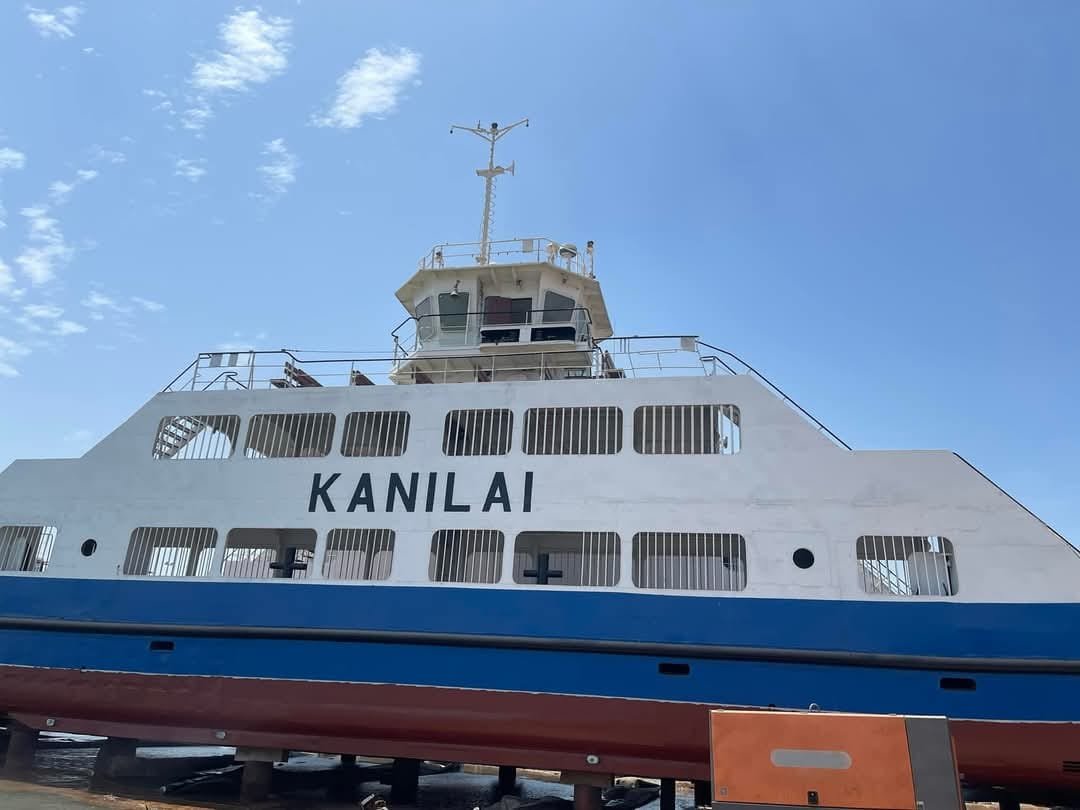Kanilai Ferry Returns to Service, but 24-Hour Operations Remain Uncertain
Kanilai Ferry © GFS Social Media
By Edward Francis Dalliah
The long-awaited return of the Kanilai Ferry has revived activity on the vital Banjul–Barra crossing, but questions remain over whether the Gambia Ferry Services (GFS) will fulfil its pledge to introduce 24-hour operations this month. While the ferry’s recommissioning marks progress after being out of service for more than a year, GFS has yet to confirm if or when round-the-clock service will begin, leaving commuters and transporters in limbo as Tobaski and the peak travel season approach.
Askanwi has been closely monitoring developments at the Banjul-Barra ferry crossing since last year, when both ferries went out of service. In December 2024, this medium reported on a promise made by the Gambia Ferry Services (GFS) to launch a 24-hour operation on the Banjul-Barra route by May 2025.
The announcement was first made in a publication by The Point Newspaper on 18th December 2024 and reiterated on the GFS Facebook page on 30th December 2024 as part of a broader update on the ongoing rehabilitation of the Kanilai Ferry.
The vessel has now resumed service, making its first trip on Friday, 2nd May 2025, after more than a year out of operation. While the government had previously failed to meet several promised return dates, the ferry’s recommissioning raises hopes, yet it remains uncertain whether the promised 24-hour operation will follow.
The Banjul–Barra crossing remains a vital link for commuters, traders, tourists, and transporters between the southern and northern regions of the country. It is currently The Gambia’s busiest ferry route, generating an average revenue of D24.4 million, according to the Minister of Transport, Works and Infrastructure, Hon. Ebrima Sillah, during a parliamentary oral question session in March 2024.
If GFS were to implement 24-hour operations, this revenue would likely increase. However, there has been no official announcement confirming the move to round-the-clock service. According to the most recent GFS update, “The first ferry from Banjul to Barra will depart at 6:00 a.m., and from Barra to Banjul at 7:00 a.m.”
Meanwhile, “the last ferry departs Banjul at 11:00 p.m. and from Barra at 12:00 midnight”, amounting to an 18-hour daily service. Still, with May just beginning and the Kanilai Ferry newly recommissioned, there remains a possibility that GFS could implement 24-hour operations before the month ends.
If implemented, this would allow commuters to cross at any time of day or night, benefiting not only GFS but also the thousands who rely on the service. With Tobaski approaching, many people are expected to use the ferry to travel to their home villages for prayers. Additionally, Senegalese travellers, who frequently use the route to reach Dakar and other parts of Senegal, would greatly benefit from the extended hours.
Furthermore, anticipation is building around the arrival of two new ferries. Their introduction could not only boost the country’s economy but also create more capacity for traffic at the Banjul-Barra route, easing congestion and enhancing overall service delivery by the GFS.
However, the expected commencement of NEGMAR operations, with its terminal conveniently being constructed at Bond Road in Banjul, could pose a significant challenge to GFS. If NEGMAR provides faster or more efficient crossings, especially for vehicles and commercial transporters, it could divert a large portion of GFS’s existing traffic. This shift may directly impact GFS’s revenue generation and reduce the economic justification for maintaining or expanding services, including the proposed 24-hour operation.

